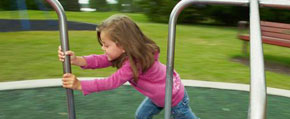We are pleased to announce an exciting new alliance between Active Living Research and GP RED to co-host and coordinate...
Promoting Physical Activity in Early Care and Education
Presentation at the 2015 Active Living Research Annual Conference.
Background
As the rate of childhood obesity has more than tripled in the United States over the past 30 years, many obesity prevention efforts have focused on school-age children and the school environment. Child care settings play a fundamental role in establishing healthy eating and physical activity habits. Over half of all children between the ages of zero and five regularly spend significant time in non-parental child care. There is untapped potential for government to take meaningful action to prevent childhood obesity through the implementation of nutrition, physical activity, screen time standards and other policies in child care settings. Every state regulates the child care setting in some manner. These state regulations differ between states, however, depending on the type of child care facility and provider. Regulatory standards play a critical role in establishing norms in child care settings. These standards also establish important baseline protections for the health and safety of children receiving non-parental care. Recent studies have assessed the strength of state child care regulatory schemes, finding that state regulations generally do not provide adequate nutrition or physical activity standards.
Description
In the summer 2014, the Public Health Law Center conducted a 50‐state review using legal analytical methods to research and examine state laws relating to nutrition, physical activity, and screen time standards for child care. This training outlines intervention and policy strategies to promote healthy eating and physical activity in the child care setting. The presenters will provide an analysis of the child care legal landscape, including statutes and regulations. The presenters will also provide a summary of the 50-state review, highlighting examples how state-specific efforts and researchers have utilized the dataset.
Lessons Learned
States regulate the early care and education settings very differently across the country. Each state defines the setting differently, and uses different terms and standards relating to nutrition, physical activity and screen-time. The American Academy of Pediatrics, American Public Health Association, and National Resource Center for Health and Safety in Child Care and Early Education have created National Health and Safety Performance Standards relating to nutrition, physical activity and screen time, yet few states incorporate those standards into the state regulatory landscape.
Conclusions
The variability of regulation in the early care and education setting makes research in this are difficult. It is critical for researchers and policymakers to understand the current state of the legal landscape prior to working on healthy eating and physical activity efforts.
Next Steps
The Public Health Law Center is using this information to develop several state-specific materials to assist stakeholders across the country. The Public Health Law Center is also providing the information to the public on its website.
References
Caring for Our Children: National Health and Safety Performance Standards; Guidelines for Early Care and Education Programs, 3rd Edition (CFOC3) - http://nrckids.org/index.cfm/products/preventing-childhood-obesity-in-early-care-and-education/
- DOWNLOAD "2015_SchoolPolicy_Frost.pdf" PDF (2.20 MB) Presentations
STAY UP TO DATE
RECENTLY ADDED TOOLS & RESOURCES
MOVE! A BLOG ABOUT ACTIVE LIVING
The "Active Living Conference" aims to break down research and practice silos and...







